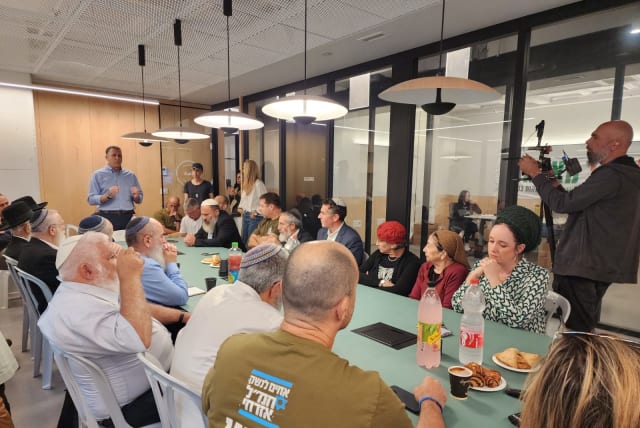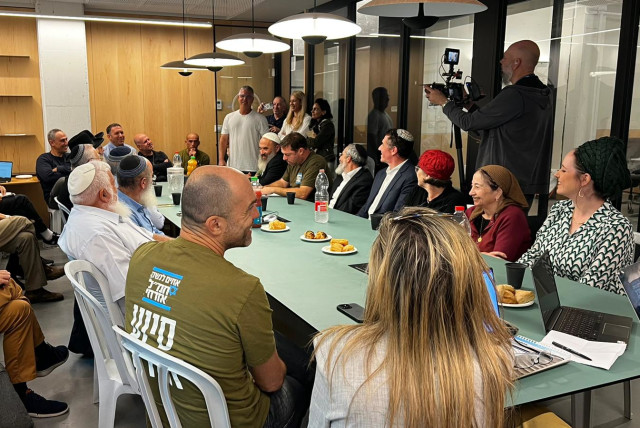Religious Zionist rabbis, anti-judicial reform protest leaders meet to talk unity

National Unity Party MK Matan Kahana initiated and organized the meeting between religious Zionist leaders and protest leaders.
Religious Zionist rabbis visited the civil headquarters of the Brothers in Arms organization on Sunday. The rabbis, some of the senior leaders of the Religious Zionist movement, toured the headquarters and received an overview of its operations since the outbreak of the war.
Eyal Neve, one of the leaders of Brothers in Arms, said that the arrival of the rabbis "is the call that we are all brothers and from today we will only follow the light of the flag of broad agreement and an understanding of the fears and needs of the other side. We will no longer allow any leadership to tear us apart from the inside; today we understand that the healing is also found 'below.'"
Gigi Levi-Weiss from Hi-Tech headquarters, said at the meeting that "the risk of leaving not united is greater than it seems. We will defeat the external enemy; the internal enemy is dangerous and we will have to make difficult decisions. Whoever does not lead out of unity cannot lead this nation. It's time to agree on the rules of the game."
'We want to reach out'
Rabbi Eitan Eisman, head of the Tzviya network of yeshivas and girls' schools, who lost two of his grandchildren in the battle in the Gaza border area on October 7, said that "this meeting changed a lot for me concerning the harsh image that was established for me of the Brothers in Arms. The hatred had broken me completely.
"I don't understand from where I felt that there were powers that are coming to attack us. We married your children, we lived together – what are you afraid of? That we will put veils on your heads? Now I see a completely different face; we want to reach out."
Rabbi Binyamin Kalmanzon, one of the founders of the Otniel hesder (pre-military) yeshiva, whose son Elhanan was killed in the battle for Be'eri on October 7, said: "I am full of admiration for your operations – it feels big.
"It is important to mobilize to correct the story. I want to sit with my friends and start beating our chests for our improper actions. I think it's appropriate for you to beat your chests, too. If we don't have this conversation and go on a common path, I have a fear that it will become worse."
Rabbi David Fendel, head of the hesder yeshiva in Sderot said: "As a resident of Sderot, I want to say that your act of kindness is amazing and I invite you to my hesder yeshiva. And yet, a political agenda must not be ignored, and therefore I am suspicious. Democracy is not just when you rule: it is not only when the government is yours."
Among those who participated in the visit were Rabbi Yaakov Ariel, rabbi of the city of Ramat Gan; Rabbi Zalman Melamed, head of the Beit El hesder yeshiva; Rabbanit Shulamit Melamed, owner of Arutz Sheva; and Rabbi Ram HaCohen, head of the Otniel yeshiva, among others.
National Unity Party MK Matan Kahana initiated and organized the visit, saying "Every citizen of Israel should ask himself: 'What do I intend to do differently so that after the war things will not look the way they did – and what price am I willing to pay for it?' If everyone only says what others need to change, we will very quickly return to the same bad place we were in."
Adi Soffer Teeni, CEO of Facebook (Meta) Israel, also took part in the meeting, noting how it was important to unite those in the center of the political map in order to connect between the various sectors of the country. Teeni also referred to the 2005 Disengagement from Gaza, apologizing that organizations like Brothers in Arms had not been there to help those being evacuated.
"During the conversations we tried to have regarding the reform, the word 'disengagement' always came up. I admit that at first I didn't understand the connection. Why are they bringing up something that isn't relevant to me, to my generation?" Teeni asked in a video shared by Arutz Sheva.
"I want to say sorry, first of all because I think today we see how relevant it is," she said. "The fact – that Brothers in Arms wasn't established during the Disengagement" like it set up to help after October 7 "to help and rehabilitate the tens of thousands of evacuees – is on us. We weren't there and today I realize how awful this is. The fact we weren't there to embrace the people who were torn out of their homes is on us."
Jerusalem Post Staff contributed to this report.
Jerusalem Post Store
`; document.getElementById("linkPremium").innerHTML = cont; var divWithLink = document.getElementById("premium-link"); if (divWithLink !== null && divWithLink !== 'undefined') { divWithLink.style.border = "solid 1px #cb0f3e"; divWithLink.style.textAlign = "center"; divWithLink.style.marginBottom = "15px"; divWithLink.style.marginTop = "15px"; divWithLink.style.width = "100%"; divWithLink.style.backgroundColor = "#122952"; divWithLink.style.color = "#ffffff"; divWithLink.style.lineHeight = "1.5"; } } (function (v, i) { });

